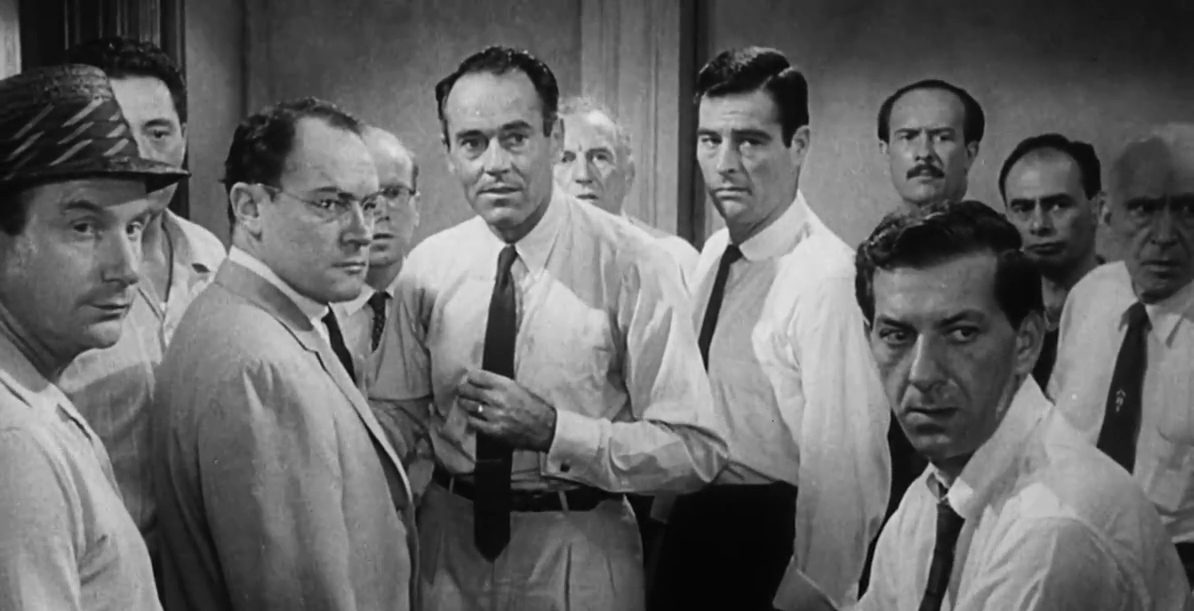Virgin Birth of Jesus: Did it Really Happen? Cold-Case Detective says Evidence is Compelling
A screenshot from the 1957 movie 12 Angry Men. Detective J. Warner Wallace says he would bring the evidence for the virgin birth of Jesus before an unbiased jury.
For almost two thousand years, the averred virgin birth of Jesus Christ has been a keystone of Christianity. Critics have questioned the story on several fronts, yet the church has steadfastly maintained that the virgin birth is neither a myth nor a metaphor. For the average layman, the miracle of Christmas is simply an article of faith. But could such a supernatural claim – rooted primarily in prophecy and ancient testimony – withstand the scrutiny of a serious legal review?
“That’s a crazy claim if you think about it,” noted cold-case detective J. Warner Wallace – a Senior Fellow at the Colson Center for Christian Worldview, and an adjunct professor of Apologetics at Biola University.
“Jesus is conceived by the Holy Spirit through Mary, without an act of sexual intercourse. She is unaware of the conception until it is announced by an angel. For me – as a non-believer – that was a deal killer. I mean, I would read the gospels and accept everything, except the supernatural. I believed that yes, there was some guy named Jesus who lived in the first century, to who all of these stories were embellished and added. But the text says he was conceived through a virgin with no biological father involved. No male seed.”
Can such a claim ever be validated? And if so, how would one do so two millennia later?
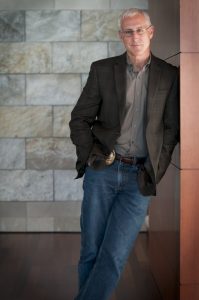
“The four gospels are the most ancient accounts that we have on the life of Jesus,” said Wallace. “So I try to be narrow and focus on the virgin conception, which is a point all Christians would agree upon.”
J. Warner’s professional investigative work has received national recognition. His cases have been featured on NBC’s Dateline (more than any other detective in America), TruTV and Fox News. Wallace still appears on television occasionally as an investigative consultant and has appeared as an expert in a number of documentaries, such as Mining for God and Jesus Revealed.
How does Wallace’s work as a cold-case detective factor into difficult questions of faith, such as the virgin birth?
“I work cold-case homicides. How that ends up being used in Christian apologetics is: All homicides are events that are locked into the history of a community. Sometimes they are as old as 35 years ago. You’re studying an event in the past, and occasionally the eyewitnesses have passed away. The writer of the supplemental report, who interviewed the eyewitnesses, may have also passed away.
“So, you don’t have access to the witnesses or the people who interviewed them.
“Once you’ve lost those witnesses, it doesn’t matter if you’re talking about 35 years or thirty-five hundred years. What do you do to corroborate their claims? How was the chain of evidence handled? Of course, the older the case, the harder it gets. But that’s the skill set I use.

“I was in my mid-thirties when I became a Christian, and I assumed everybody took this path. It wasn’t until later that I realized that very few people are investigating the claims of Christianity that prove its historical veracity. Most people who become Christians will tell you they were raised in the church or had an experience. For me, it came down to an issue of trust. Could I trust what these eyewitnesses said? Could I trust that it was reliable?”
Wallace said he came to trust the reliability of the early witnesses (Gospel writers Matthew, Mark, Luke, John; St. Peter; the Apostle Paul; and John’s disciples: Ignatius, Papias, and Polycarp) as he saw consistency in their stories and care with the chain of evidence.
“Where the early accounts differ, it is where each writer focused on the things that he wanted to tell us. The witness testimony is not going to include every single detail of a particular event. Remember, this is what I do for a living. I saw this in criminal cases, where a witness focuses on one thing to the neglect of a lot of others. If you back them up, and ask, ‘Well, didn’t you see this too?’, they may say, ‘Yeah, I saw that, but I want to focus on this.’”
Wallace also believes that some of the ancient attacks against the virgin conception actually help build a case for the Christian claim.
“There are a couple of ways you can attack the virgin birth. One is to say that it is a pure invention.
“Another is that it is borrowed from some prior mythology. But here is the problem – yes, there are certain supernatural births that occur in pagan mythology. And for that reason, I think it would be a much harder sell to the Jews; to the very people whom early Christians were trying to convince of the notion of a Messiah that comes into the world in this way.
“Early Jews were always resistant to polytheistic pagan theologies surrounding them. Why introduce a virgin birth as an additional narrative?
“It’s too dissimilar from a Jewish way of speaking, but it’s not so similar to pagans that they would have accepted it either. I’ve gone through books that look at this very issue, and there is nothing exactly like it. It’s in that sweet spot where, if it happens to be true, then you’re stuck with it.
“People still say, ‘Is it possible the virgin birth story was borrowed from pagan mythology?’ From a legal standpoint, you have to say, ‘Yes, anything is possible.’ But that’s not our standard. Our standard is, ‘Is it reasonable?’ And I would have to reject the pagan correlation on those grounds.”
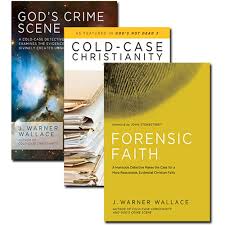
So is the virgin conception story reasonable?
“Yes, and here’s what I think makes it reasonable. As a non-believer, there was nothing – no claim of anything extra-natural or supernatural – that I would have considered reasonable. I was such a committed naturalist that, if I could not explain it through space, time, matter, physics and chemistry, I would reject it as unreasonable. The sciences were the only things I would allow as causation.
“Then one day, I realized that, as an atheist, I had embraced Big Bang cosmology. The standard cosmological model is this notion that all space, time and matter come into being at the beginning of the universe, and this happens with a force that is outside of space, time and matter. Non-temporal, non-physical.
“Back then I would have said, ‘Well, this has to be some kind of a force, but what if, whatever it is, it’s not some kind of impersonal force, but a personal agent.’
“Now, I think that agent has the ability to do anything!
“Walk around on water? Small potatoes. Virgin birth? Small potatoes. Rise from the dead? Small potatoes. Once you realize that that personal being is out there, then the most unbelievable miracle in scripture is not in the New Testament gospels, but in Genesis chapter 1.
“The beginning of the universe came from nothing. For me, that opened up the door.
“Miracles are unreasonable only if you first presuppose that there is nothing outside of space, time, and matter. If that’s what you’ve presupposed, than yes, the virgin conception is unreasonable. But I think there is a good reason not to presuppose that, based on astrophysics and the cosmology of the beginning of the universe. So it is reasonable to rope this back in.”
Wallace said, if he were chatting with a non-believer, he wouldn’t necessarily start with the virgin conception when creating a case for Christianity.
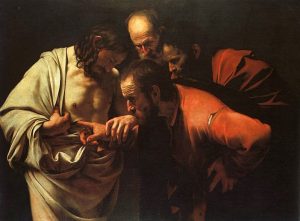
“The biggest issue is the resurrection, and if the resurrection didn’t occur, then all of this is for nothing. Paul tells us that, in I Corinthians 15. If I was going to start a conversation with an unbeliever, I would probably start with the resurrection, but I think the virgin conception is an essential for Christianity.”
How so?
“It’s essential in the way it fulfills prophecy from the Old Testament. Remember, in the first century, those people who were making the case for Christianity in the Book of Acts did it by saying the Old Testament prophesies X, and we saw it happen with our own eyes. Their testimony becomes a piece of evidence.
“The second reason it is essential is it explains the nature of Jesus. Let’s face it: God could have entered (human history) any number of ways, but He chose this way. He came into the world through a virgin.
“He comes in a supernatural way that retains His sinlessness.
“Thirdly, I believe it is an essential, because it gives an essential truth about God Himself.
“The Bible makes lots of claims about the planet we live on, the universe around us, the nature of God’s activity in the universe – and the virgin conception is just one of those claims. If you trust that God is telling us the truth in other areas of scripture – and I do – then I don’t see any reason to doubt Him on this truth. I just think the virgin conception assures us that the Son of God – Jesus Christ – is the eternal, all-powerful, all-knowing, ever-present God of the universe. That’s why He comes into the world in a unique way, and acts uniquely to be the sacrifice for our sins.
“This is why I would say the virgin conception is an essential.”
Having looked at all of the available evidence and carefully weighed the reliability of the first-century witnesses, we wondered if Wallace would take this case into court?
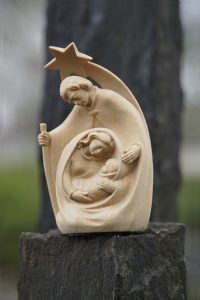 jhenning from <a href=https://baltimorepostexaminer.com/virgin-birth-of-jesus-did-it-really-happen-cold-case-detective-says-evidence-is-compelling/2020/01/"https://pixabay.com/?utm_source=link-attribution&utm_medium=referral&utm_campaign=image&utm_content=4735448%22>Pixabay%22 width="200" height="300" srcset="https://baltimorepostexaminer.com/wp-content/uploads/2020/01/mary-4735448_1920-200x300.jpg 200w, https://baltimorepostexaminer.com/wp-content/uploads/2020/01/mary-4735448_1920-683x1024.jpg 683w, https://baltimorepostexaminer.com/wp-content/uploads/2020/01/mary-4735448_1920-768x1151.jpg 768w, https://baltimorepostexaminer.com/wp-content/uploads/2020/01/mary-4735448_1920-1025x1536.jpg 1025w, https://baltimorepostexaminer.com/wp-content/uploads/2020/01/mary-4735448_1920.jpg 1281w" sizes="(max-width: 200px) 100vw, 200px" />
jhenning from <a href=https://baltimorepostexaminer.com/virgin-birth-of-jesus-did-it-really-happen-cold-case-detective-says-evidence-is-compelling/2020/01/"https://pixabay.com/?utm_source=link-attribution&utm_medium=referral&utm_campaign=image&utm_content=4735448%22>Pixabay%22 width="200" height="300" srcset="https://baltimorepostexaminer.com/wp-content/uploads/2020/01/mary-4735448_1920-200x300.jpg 200w, https://baltimorepostexaminer.com/wp-content/uploads/2020/01/mary-4735448_1920-683x1024.jpg 683w, https://baltimorepostexaminer.com/wp-content/uploads/2020/01/mary-4735448_1920-768x1151.jpg 768w, https://baltimorepostexaminer.com/wp-content/uploads/2020/01/mary-4735448_1920-1025x1536.jpg 1025w, https://baltimorepostexaminer.com/wp-content/uploads/2020/01/mary-4735448_1920.jpg 1281w" sizes="(max-width: 200px) 100vw, 200px" />“Yes, and I’ll tell you this:
“When I talk about this evidence, I always think in terms of how it would sound in front of a jury. But I will tell you, we have a system called the voir dire process, in which we select jurors. We don’t just put anyone into the jury box. We only put those people in the box that we think are able to take their biases and withhold them.
“There are lots of people we do not put in the box. Sometimes, when I talk with my friends about faith, I think, ‘Are they even in a place where they would listen?’”
“Both sides in any case get to reject a certain number of potential jury candidates, because they don’t think the candidate would be fair. Some people would not be fair on the virgin birth issue, and I get that.
“There are also people you’ll encounter during the holidays who are not interested in whether or not Christianity is true. They might sound like they are, but they are really not, and it’s our job to figure out if that person is even receptive to the possibility.
“Are they reasonable skeptics, or have they already rejected out of hand any claim that you can make? There is a way to deal with those people – you pray and you model. But in jury selection, they’re what I call a ‘4′, and 4’s don’t get on my jury.
“I also don’t take somebody who is sold out for my side. That would be a ‘1.’ The other side isn’t going to allow any 1’s anyway, and I don’t want a ‘4′, because he’s in the pocket for the other side.
“Both the defense and prosecution want 2’s and 3’s. People in the middle – even if they lean to one side or the other – will still listen to you. So, yes, I would put this in front of a jury after doing two things. One, we select the jury first, trying to eliminate the bias. And two, we take time explaining the rules of evidence.

“There are jury instructions in every state in America. We don’t just drop a bunch of stuff on the table and say, ‘Here it is – just go at it!’ No, we teach them what the rules of evidence are. What’s the standard of proof? How do you determine if an eyewitness is reliable?
“These are things we typically never do when we are talking to our friends about Christianity.”
If the evidence is so good, why doesn’t everybody believe it?
“There are lots of things that keep you from a truth claim that have nothing to do with evidence. It has much to do with your likes and dislikes, your personal history growing up, all types of other things that end up weighing into your decision making. Even when the evidence is strong.
“That’s sad, but it’s true.
“In reality, it all comes down to why does anybody reject this? Because they reject the existence of God and therefore anything supernatural that may have occurred. Or, they may believe in a god – they just don’t want to believe it’s this guy.
“You don’t have to reject the thinking process to be a Christian. Christianity is never described in the scripture as a blind faith.
“Even though I’m not always convinced that my argument will persuade somebody in my family who is not a Christian, I do know that I don’t have to drop all sense of reasoning in order to believe that Christianity is true.
“I think the case we have is quite compelling and very powerful.”
* * * * *
Editor’s note: This is the 32nd part of an ongoing series which looks at the places and people that make up the rich history and diverse nature of spirituality, belief and observance in Baltimore and beyond. Read the series here.

Anthony C. Hayes is an actor, author, raconteur, rapscallion and bon vivant. A one-time newsboy for the Evening Sun and professional presence at the Washington Herald, Tony’s poetry, photography, humor, and prose have also been featured in Smile, Hon, You’re in Baltimore!, Destination Maryland, Magic Octopus Magazine, Los Angeles Post-Examiner, Voice of Baltimore, SmartCEO, Alvarez Fiction, and Tales of Blood and Roses. If you notice that his work has been purloined, please let him know. As the Good Book says, “Thou shalt not steal.”

